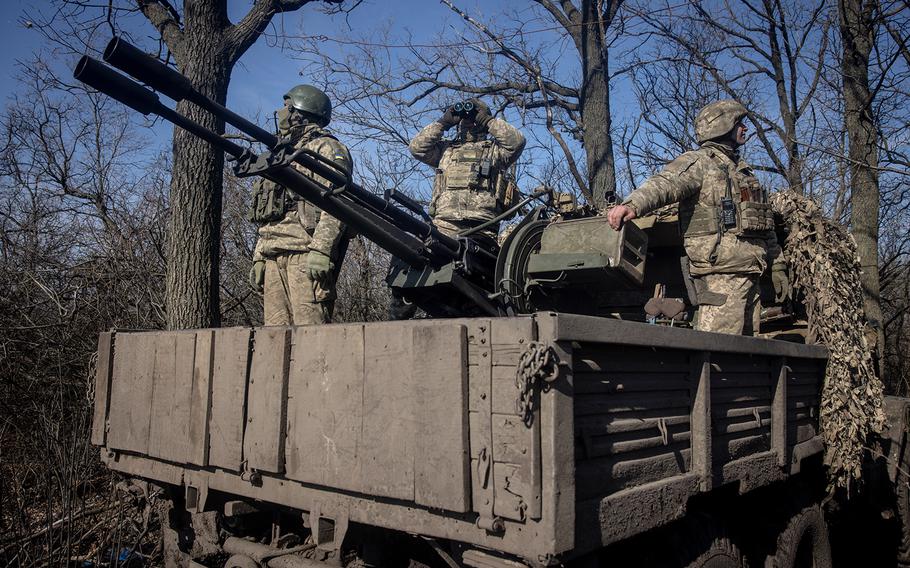Opinion
How war in Ukraine changed the post-Soviet generation
Special to Stars and Stripes April 9, 2024

Members of Ukraine’s 72nd Brigade anti-air unit stand on the back of a ZU-23 anti-aircraft autocannon while using binoculars to search for incoming Russian drones at a front-line position on Feb. 23, 2024, near Marinka, Ukraine. (Chris McGrath, Getty Images/TNS)
In March 1990 Lithuania declared independence from the Soviet Union. Just six years later, I was born to a Ukrainian-Lithuanian family. While I was born in a free country, from an early age the price of freedom became ingrained in my consciousness. Tales of the resistance of the “Forest Brothers” and sorrows of the Lithuanian peaceful protesters dying under the Russian tanks were taught in high-school curriculum. I never lived under the Soviet occupation, but the stories of my parents and grandparents made me understand how dire life was without freedom. It also made me appreciate all the opportunities democracy has given me even more.
Studying political science at a leading French university, I did so while believing in Fukuyama’s “end of history.” But as I woke up on the morning of Feb. 24 two years ago and saw Russia’s full-scale invasion of Ukraine, I knew — the story of my generation is about to change forever.
While the war in Ukraine touched the whole world, it affected those in the post-Soviet countries the hardest. It evoked decades-long collective trauma in both those who lived under oppression and the generation who only knew freedom. The immediate fear was changed by existential questions. The biggest test to our collective security of our generation made many wonder: Would NATO — an alliance that we idealized since our childhood — really come to help the small vulnerable Baltic countries in the case of a Russian attack?
These questions come as no surprise given that we failed Ukraine, over and over. As the country is entering the third year of war, the situation never looked more perilous for Kyiv. With every arms shipment being late and the indecisive U.S. Congress blocking arms deliveries to Ukraine, Kyiv is experiencing ammunition starvation that has direct detrimental effects on the battlefield. Just recently, Ukrainian officers have warned the West that the situation is so precarious that ‘’there’s a great risk of the front lines collapsing wherever Russian generals decide to focus their offensive.’’ That is coupled with a possible economic breakdown as multiple European countries are protesting Ukraine’s preferential trade with the European Union.
As Ukraine is experiencing these setbacks, many in the West are facing war fatigue and diminishing their support. The situation is further complicated by 2024 being the year of election. As voters take it to polls in Europe and across the Atlantic, Russian President Vladimir Putin is well-positioned to use the domestic distractions in his favor. Combining Russia’s military advances with the Western leaders being in the middle of their election campaigns, can revive Western pressure for negotiations, with the Kremlin having the upper hand.
But if Ukraine falls, so does democracy. We have seen Putin taking 20% of Georgia, occupying Crimea, and proceeding with a full-scale invasion of Ukraine. If Putin succeeds in taking Ukraine, or a part of it, war is bound to expand further into Europe, threatening the Baltics and the Balkans. As NATO — an alliance created to protect our freedom — is celebrating its 75th anniversary, it is about to face the greatest challenge yet, and so is our generation. The time for the West to act is now — just like it was in 1940, when the Russian tanks rolled into the Baltics. Democracy failed then, but it cannot fail now.
It is because the story of our generation will be determined by the outcome of the war in Ukraine. It will either be one of resistance and freedom, or a repeated cycle of oppression that our grandparents fought to prevent. While Russia’s attack is primarily on Ukraine, it is also an attack on every single one of us: our lives, our dreams and our futures. Putin is also oppressing his own people, whose lives could be similar to ours if Russia was ever free.
But the only way to dismantle the Kremlin, remove the threat to our freedoms and help a whole new generation of Russians is by achieving victory in Ukraine. The war has been lengthy and many of us have become accustomed to its existence while residing in the safeness of London, Paris or Washington. However, the Russian threat is closer than many of us think.
As news of Russian sonic weapons targeting U.S. diplomats and officers with a Havana syndrome in the streets of Washington came to light, it seemed too unrealistic to be true. So once did Russian tanks in Kyiv. But since all of this is modern-day reality, we must acknowledge that we stand at a critical juncture of history and the collective decisions of the West will determine the destiny of our generation.
We allowed Putin to invade Ukraine, we allowed the Russian dictator to attack international diplomats on their home soil, and the question remains — when will the West decide that Putin has done enough? As the Baltics commemorate 85 years since Soviet occupation next year, it will be the willingness of the West to achieve victory in Ukraine that will determine whether we meet this anniversary free.
Monika Bickauskaite-Aleliune is a former Global Policy Engagement Officer at the Legatum Institute and a former researcher at the German Marshall Fund.